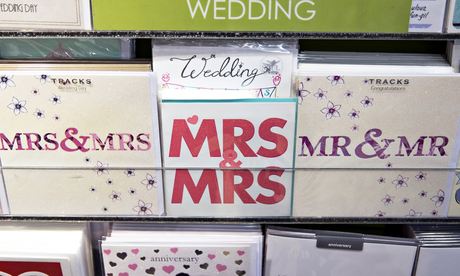Why Gay ‘Marriage’ Has Not Cured Gay Loneliness
 Charisma News 30 February 2017
Charisma News 30 February 2017
Family First News: This is a fascinating read…
“This feeling of emptiness, it turns out, is not just an American phenomenon. In the Netherlands, where gay marriage has been legal since 2001, gay men remain three times more likely to suffer from a mood disorder than straight men, and 10 times more likely to engage in ‘suicidal self-harm.’ In Sweden, which has had civil unions since 1995 and full marriage since 2009, men married to men have triple the suicide rate of men married to women.”… Why is it that there are other sub-groups in our society that would seemingly experience high levels of minority stress due to their numbers, their isolation and their social status, and yet experience few of the emotional or physical traumas experienced in the LGB community?”
Michael Hobbes, the author of the article on “The Epidemic of Gay Loneliness,” writes “the gay community has made more progress on legal and social acceptance than any other demographic group in history.” Yet, he laments, “even as we celebrate the scale and speed of this change, the rates of depression, loneliness and substance abuse in the gay community remain stuck in the same place they’ve been for decades. Gay people are now, depending on the study, between 2 and 10 times more likely than straight people to take their own lives. We’re twice as likely to have a major depressive episode. And just like the last epidemic we lived through, the trauma appears to be concentrated among men. In a survey of gay men who recently arrived in New York City, three-quarters suffered from anxiety or depression, abused drugs or alcohol or were having risky sex—or some combination of the three.”
Can this be blamed primarily on “homophobia”? Hardly. Hobbes cites Christopher Stults, “a researcher at New York University who studies the differences in mental health between gay and straight men.” Stults stated that, “Marriage equality and the changes in legal status were an improvement for some gay men. But for a lot of other people, it was a letdown. Like, we have this legal status, and yet there’s still something unfulfilled.”
Could it be that, generally speaking, there’s something intrinsically unfulfilling about homosexual relationships? Could it be that, by divine intent, ultimate relational fulfillment for human beings can be found only in heterosexual marriage? I’m sure many gay readers will say to me, “Obviously, you don’t know me or the relationship I have with my spouse. How dare you make such a generalization!” But I’m merely asking questions based on: 1. the data being presented here; 2. biblical reasoning; and 3. testimonies from ex-gays, who have spoken to me about the qualitative differences between their old, homosexual relationships and their current heterosexual marriage.
Interestingly enough (and sadly enough), Hobbes explains that, “This feeling of emptiness, it turns out, is not just an American phenomenon. In the Netherlands, where gay marriage has been legal since 2001, gay men remain three times more likely to suffer from a mood disorder than straight men, and 10 times more likely to engage in ‘suicidal self-harm.’ In Sweden, which has had civil unions since 1995 and full marriage since 2009, men married to men have triple the suicide rate of men married to women.”
…. Looking back to the mid-20th-century, Hobbes notes that initially, researchers in the ’50s and ’60s attributed the mental and emotional problems experienced by a large percentage of gay men to “homosexuality itself, just one of many manifestations of what was, at the time, known as ‘sexual inversion.'” But, he continues, “As the gay rights movement gained steam … homosexuality disappeared from the DSM and the explanation shifted to trauma.”
In short, gay suicides and gay depression and other emotional (and physical and social) problems were believed to be the fault of a homophobic society. But as Canadian researcher Travis Salway reviewed the data, he realized that, “The problem wasn’t just suicide, it wasn’t just afflicting teenagers and it wasn’t just happening in areas stained by homophobia. He found that gay men everywhere, at every age, have higher rates of cardiovascular disease, cancer, incontinence, erectile dysfunction, allergies and asthma—you name it, we got it. In Canada, Salway eventually discovered, more gay men were dying from suicide than from AIDS, and had been for years.”
Indeed, says Alex Keuroghlian, a psychiatrist at the Fenway Institute’s Center for Population Research in LGBT Health, “We see gay men who have never been sexually or physically assaulted with similar post-traumatic stress symptoms to people who have been in combat situations or who have been raped.” These researchers describe this phenomenon as “minority stress.” As Hobbes explains, “In its most direct form, it’s pretty simple: Being a member of a marginalized group requires extra effort.”
…. why is it that there are other sub-groups in our society that would seemingly experience high levels of minority stress due to their numbers, their isolation and their social status, and yet experience few of the emotional or physical traumas experienced in the LGB community?
Hobbes closes his article with these words: “I keep thinking of something Paul, the software developer, told me: ‘For gay people, we’ve always told ourselves that when the AIDS epidemic was over we’d be fine. Then it was, when we can get married we’ll be fine. Now it’s, when the bullying stops we’ll be fine. We keep waiting for the moment when we feel like we’re not different from other people. But the fact is, we are different. It’s about time we accept that and work with it.'”
READ MORE: http://www.charismanews.com/opinion/in-the-line-of-fire/63446-why-gay-marriage-has-not-cured-gay-loneliness?utm_source=In%20the%20Line%20of%20Fire&utm_medium=email&utm_content=subscriber_id:793655&utm_campaign=Blogger%20-%20Michael%20Brown%20-%202017-03-06







